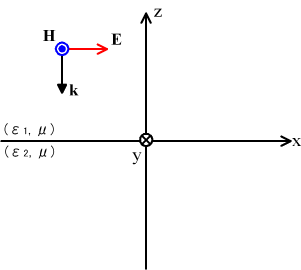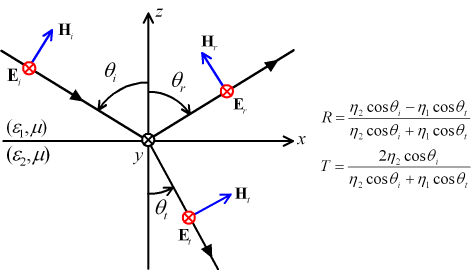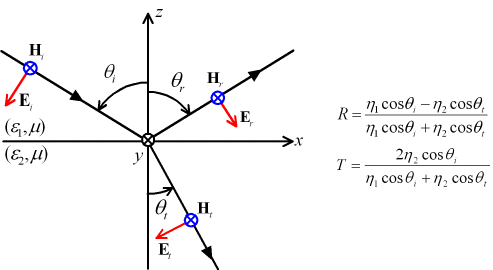Reflection and transmission of a plane wave
1. Perpendicular incidence

In the animation here, suqare of electric field is shown.
2. Oblique incidence
2.1 Vertical polarization
Under the appropriate material condition,
there exist incident angles so that
all the incident wave is reflected
(perfect reflection(?)).
The minimum incident angle is called as
critical angle.

In the animation here, suqare of electric field is shown.
2.1.1 No Ohmic loss
2.1.2 Ohmic loss
- epsr1=1, epsr2=1, sig2=0.003, theta_i=60degrees
- epsr1=1, epsr2=2, sig2=0.003, theta_i=60degrees
- epsr1=1, epsr2=2, sig2=0.01, theta_i=60degrees
---LiveGraphics3D
Animation!
- É√r1=1, É√r2=2, sig2=1000, theta_i=60degrees
- epsr1=2, epsr2=1, sig2=0.003
- epsr1=1, epsr2=1, sig2=0.001 to
10 (Vary electric conductivity)
2.2 Parallel polarization
In the case of parallel polarization, there exists the incident angle,
called Brewster angle,
so that all the incident wave transmit without reflection
(no such angle in vertical polarization).
Brewster angle always exists free from the matrial condition.
Perfect reflection exists as well as the case of vertical polarization.

In the animation here, suqare of magnetic field is shown.
2.2.1 No Ohmic loss
- epsr1=1, epsr2=2 (Perfect reflection doesn't occur under this material condition)
- epsr1=2, epsr2=1 (critical angle: 45degrees)
2.2.2 Ohmic loss
Not completed...but almost the same as vertical polarization.
Go Back



